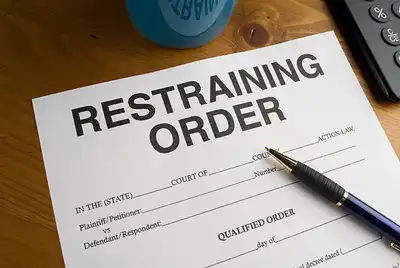How to Get A Restraining Order in South Africa?

A restraining order is a court-issued document that prevents someone from being threatened, stalked, harassed, or physically or sexually abused by another person in Africa. A restraining order is meant to protect the victim from the abuser.
In South Africa, restraining orders can be of two different types:
- Interim protection order: The abuser is not present when the court issues this temporary order.
- Protection order: The court will issue this more permanent order after the abuser has had a chance to appear in court and present their side of the story.
Where to get it
In South Africa, the victim must go to their neighborhood police to obtain a restraining order.
The victim must put out an application for a protection order at their neighborhood police station. The victim will then have to defend their need for a restraining order in court before the judge.
An interim protection order will be issued by the judge if they determine that the victim needs to be protected. The abuser will not have an opportunity to show up in court before this order goes into force.
Body 2:
The judge will hear both sides of the argument if the abuser shows up in court and will then determine whether or not to grant a protection order. A protection order will be issued by the judge if they determine that the victim still requires protection. This directive will take effect.
What’s The Process for obtaining A Restraining Order In SA?
The domestic violence and sexual harassment protection orders issued by SAPS, or South Africa Police Service, provide guidance that would prevent the recurrence of these situations by outlining what the alleged offender must not do. The complainant, a female, will be safe as long as the defendant complies with the protective order.
Will a court issue a protection order when there is no evidence of harm
The solution to the preceding query is straightforward. Yes. A person can suffer injury from abuse in addition to physical violence. A person might often suffer more harm from verbal and/or emotional abuse than they would from physical violence (such as threats or insults). Abuse of any kind—emotional, verbal, or psychological—is viewed as a pattern of demeaning or humiliating behavior against another individual. This involves disparaging remarks, teasing, threatening to inflict emotional harm, being too possessive, or showing envy. This should be done in a way that seriously violates the applicant’s integrity or privacy.
- How to Get a Letter of Authority in South Africa
- How to Win the Lottery in South Africa
- Does Cash App Work In South Africa?
- Which Law Protects Against Gender-Based Violence In South Africa?
- How To Win Small Claims Court In South Africa?
- How is Money Made in South Africa?
- Who Is The Richest Black Person In South Africa?
How long is the duration of a restraining order?
A judge may order you to undergo retraining after a court hearing, which normally lasts up to five years or longer. If the order has no termination date, it may have a lifespan of three years, but only if it will expire before that time.
A Restraining Order Could Expire?
Although many are granted for very long periods of time, restraining orders may have an indefinite term. The situation, the severity of the attacks, and, at worst, the possibility that the victim would be put in even greater danger determine how long the order will last. The restraining order typically takes 10 days to 1 year to take effect.
In South Africa, obtaining a restraining order is a legitimate means of defense against abuse. You can fill out an application for a protection order at your neighborhood police station if you are the victim of abuse. After that, you’ll have to show up in court to present your case to the judge. A temporary protection order will be issued by the judge if they determine that you require protection. The judge will hear both sides of the argument if the abuser shows up in court and will then determine whether or not to grant a protection order. If the judge determines you still require protection,
Share This





